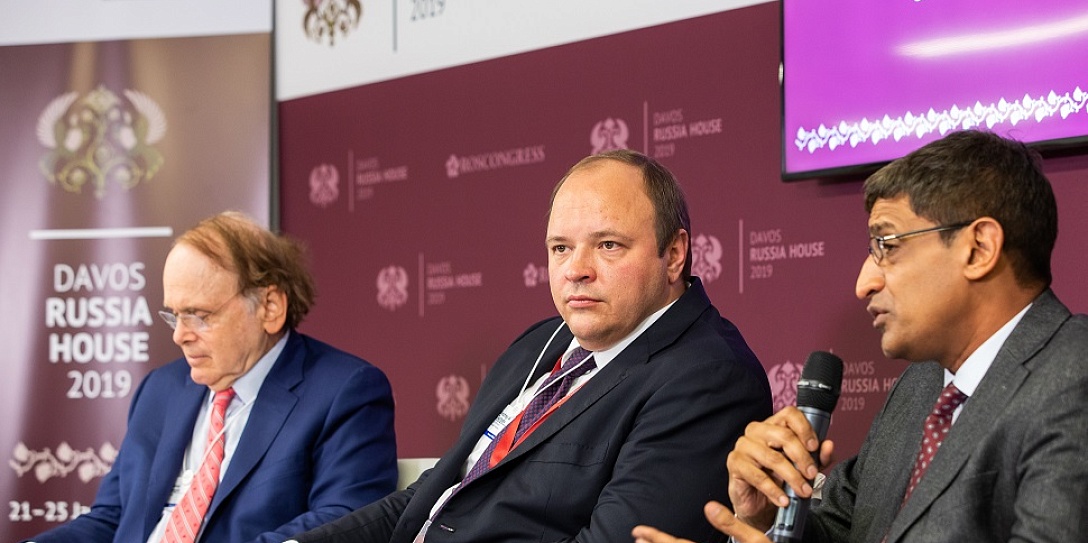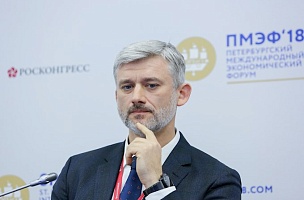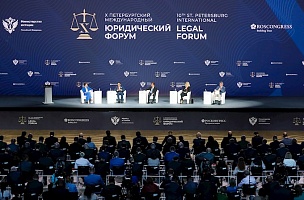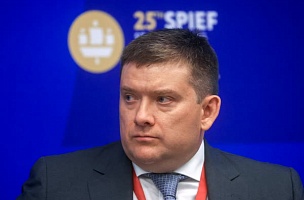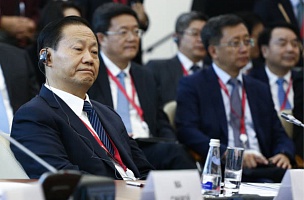Geopolitical trends have the greatest impact on the development of the Russian economy, as they increase the degree of uncertainty
“Sanctions have an impact on the Russian economy, but frankly speaking, geopolitics and the state of the global economy have a much greater impact,” Andrey Guryev, Chief Executive Officer, Chairman of the Management Board, PhosAgro.
“I remain optimistic about Russia, but it is difficult [...] I think it is primarily because of global politics,” Shiv Vikram Khemka, Vice Chairman, SUN Group.
Russian foreign economic policy turns to the East due to objective prospects for developing cooperation with the Asian countries, and not exclusively as a response to pressure from the Western countries
“As the Americans and the Western Europeans started to tighten controls on the Russian economy and limit access to certain products and financial services, the pivot to the East was one way of responding to that,” Geoff Cutmore, Anchor, CNBC.
“There is a significant leap in the China–Russia business. We saw a very sharp increase in the Russian exports to China, 48% in 2018 […] USD 107 billion, which makes Russia the tenth largest China’s trading partner,” Geoff Cutmore, Anchor, CNBC.
“China–Russia relations get a lot of tailwind. The number one reason is the trade war between Washington, D.C. and Beijing. It gave an unintended tailwind to a closer tie-up between Russia and China,” Huang Shan, Deputy Editor, Caixin.
“Many describe the Russia–China relations as an opportunistic partnership or a marriage of convenience. But it is now much more solid. If you look at trade, it has extended into areas like finance, IT, automotive and machinery. We see growth in hi-tech, new technologies and aerospace industry,” Huang Shan, Deputy Editor, Caixin.
Sanctions against the Russian economy create prerequisites for the successful development of not only certain Russian companies, but entire economy sectors
“Our company has basically doubled in the last five years. We started with 5 million tons of fertilizers, now we make 9 million tons,” Andrey Guryev, Chief Executive Officer, Chairman of the Management Board, PhosAgro.
“Most Russian companies are now leaders in what they do not only in Russia, but in the world,” Andrey Guryev, Chief Executive Officer, Chairman of the Management Board, PhosAgro.
“62 or 64 different sanctions have already been imposed on Russia. We now see that as a rhetorical issue. We live with this reality, and we are not waiting for these sanctions to be lifted,” Andrey Guryev, Chief Executive Officer, Chairman of the Management Board, PhosAgro.
“Food has been a great beneficiary as a result of sanctions. Russians now rely on their own food industry,” Shiv Vikram Khemka, Vice Chairman, SUN Group.
Situation in the energy markets remains generally stable and conducive to the development of the Russian economy
“Last year the average price for Brent was USD 71 with a lot of volatility, this year we think it will be in the high 60s, which meets the Russian targets,” Daniel Yergin, Vice Chairman, IHS Markit.
“There is a double risk for the oil price […] What happens to US shale oil, how fast does that grow? What happens in terms of the trade dispute and slowdown in China?” Daniel Yergin, Vice Chairman, IHS Markit.
“The new relationship between Russia and Saudi Arabia is quite significant for both countries,” Daniel Yergin, Vice Chairman, IHS Markit.
“Things change. Ten years ago, the US was going to be a big importer of the LNG […] There were going to be three countries in terms of LNG exports, but now it looks like there is going to be a fourth one, and that is going to be Russia. Russia now has a whole new element, the Northern Sea Route. People are just now beginning to realise that Russia is going to be a big player […] That is a political target for Washington, D.C.” Daniel Yergin, Vice Chairman, IHS Markit.
Problems
Low growth and imperfect structure of gross domestic product
“We need to strive for higher GDP growth. Perhaps, we need to talk not only about GDP, but productivity in general,” Andrey Guryev, Chief Executive Officer, Chairman of the Management Board, PhosAgro.
“Clearly, 1.8% growth is not great for the potential that Russia has. Russia could be growing easily at 6%, 7% or 9%. But, unfortunately, geopolitical headwinds are strong,” Shiv Vikram Khemka, Vice Chairman, SUN Group.
“Russia has not diversified adequately. We see insufficient levels in processing industry and petrochemistry,” Shiv Vikram Khemka, Vice Chairman, SUN Group.
Insufficient domestic markets
“Our latest economic analysis has Russia growing last year at 1.6%, this year at 1.3%, and the reason is weakness in personal consumption which makes up about 50% of the GDP, while the strength of the economy comes from the non-oil exports,” Daniel Yergin, Vice Chairman, IHS Markit.
Russian financial sector is not always ready to compete in the Asian markets
“When we talk about Russia and VTB Bank, we need to remember that Russian banks try to tap into the Chinese market in terms of fundraising and raising capital. Quite a few Russian companies are ready to go public in China, some have already done so. But in terms of volume, the Russian companies and the Russian banks are still small players. I do not think that any time soon we will see much progress or any major changes in terms of the participation of the Russian companies and the Russian banks in the Chinese financial market,” Huang Shan, Deputy Editor, Caixin.
The ‘new Iron Curtain’ stands in the way of human capital, investment and technology
“I think, the message now conveyed from Washington is quite clear: China is no longer a friendly country, and the past approach to engage China turns out to be false, so we must change course and reflect upon our mistakes. Whether or not there is a new administration in Washington in 2020, the consensus is building up that China is not a very reliable friend. The so-called ‘responsible stakeholder’ concept no longer works. I think, we now come to economic cold war, rather than geopolitical cold war,” Huang Shan, Deputy Editor, Caixin.
Solutions
Government of the Russian Federation contributes the operation of Russian companies abroad and foreign companies in Russia
“Today, the Government along with the President of the Russian Federation try to provide the export companies with all the opportunities, such as various subsidies and privileges in terms of taxation, so that companies would invest and grow,” Andrey Guryev, Chief Executive Officer, Chairman of the Management Board, PhosAgro.
“The Russian Government has made a lot of progress in terms of listening to the foreign investors and adjusting the legislation in order to create equal conditions for all,” Shiv Vikram Khemka, Vice Chairman, SUN Group.
“Speaking of cooperation between Russia and India, countries of Africa or Brazil, we have already created all the necessary infrastructure, such as railways and ports. Everything for the maintenance and development of Russian agriculture and trade of Russian agricultural products, which today are the most environmentally friendly. This is a matter of government support and subsidies that were distributed in a proper and timely fashion,” Andrey Guryev, Chief Executive Officer, Chairman of the Management Board, PhosAgro.
Dynamic transition to modern technologies and increased productivity
“Most plants and factories built in the Soviet time have great potential. Certainly, it is necessary to introduce digitalization and robotics,” Andrey Guryev, Chief Executive Officer, Chairman of the Management Board, PhosAgro.
“My deep personal belief is that the focus should really be on the education system […] and if Russia does that well, then it can really build itself into a leader of the Fourth Industrial Revolution,” Shiv Vikram Khemka, Vice Chairman, SUN Group.
Using the geopolitical and geo-economic reality for the development of the Russian economy
“We need to understand global trends that we see now, especially in the global economy. This applies to trade wars and currency wars between the US and Europe, the US and China,” Andrey Guryev, Chief Executive Officer, Chairman of the Management Board, PhosAgro.
“We now see that the US is its own best friend. What can Russia do about it? What we do best: offer the best products, services and technological solutions. To keep everyone happy,” Andrey Guryev, Chief Executive Officer, Chairman of the Management Board, PhosAgro.
“Some of the space that the US backtracked from […] allowed an opportunity for Russia and its businesses to do more,” Shiv Vikram Khemka, Vice Chairman, SUN Group.
“Russia is extremely well positioned, and it may take advantage of this position to ride the tremendous growth in the [Asian] region. […] Russia has a large role to play, not only in terms of transportation linkages with Asia and Western Europe, but also in terms of raw materials and many other things,” Shiv Vikram Khemka, Vice Chairman, SUN Group.
“Speaking of the fast-developing countries, such as Bangladesh and Pakistan, those are exactly the markets that we should bet on, particularly in some industries. First of all, it is agriculture, and today subsidies are being allocated for the agricultural development in the Russian Far East, in Khabarovsk and Vladivostok. Chinese companies are also interested, and there are several questions about legislation now on how Russian meat can be exported to China,” Andrey Guryev, Chief Executive Officer, Chairman of the Management Board, PhosAgro.
“I think, we now come to economic cold war, rather than geopolitical cold war. That means China must find other sources to get help […] Of course, Russia is one of the choices, and we understand that Russia may become one of the important sources of technology. Russia excels at military technology, but there are also dual-use technologies,” Huang Shan, Deputy Editor, Caixin.
“We always look for new opportunities in our business, and we try to identify new emerging trends. The longest border is between Russia and China, most of the food products from Latin America and the US come across this border. The first thing we can do tomorrow is to work on that,” Andrey Guryev, Chief Executive Officer, Chairman of the Management Board, PhosAgro.
Information may be used with a mandatory link to the Information and Analytical System of the Roscongress Foundation.


